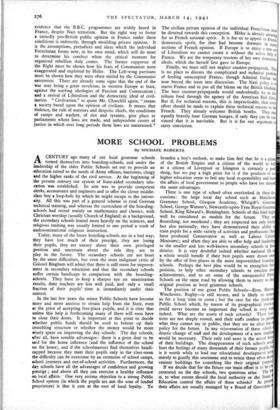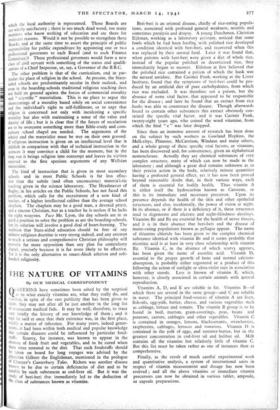MORE SCHOOL PROBLEMS
By MICHAEL ROBERTS
ACENTURY ago many of our local grammar schools turned themselves into boarding-schools, and under the leadership of the older Public Schools set out to provide an education suited to the needs of Army officers, barristers, clergy and the higher ranks of the civil service. At the beginning of the present century our system of State-aided secondary edu- cation was established. Its aim was to provide competent Jerks, accountants and engineers and to offer the clever middle- class boy a loop-hole by which he might escape to the univer- sity. All this was part of a general scheme to rival German technical training, and whereas the curriculum of the boarding- schools had rested mainly on mathematics and classics, with Christian worship (usually Church of England) as a background, the secondary schools leaned more heavily on the sciences, and religious training was usually limited to one period a week of undenominational religious instruction.
Today, many of the lesser boarding-schools are in a bad way; they have lost much of their prestige, they are losing their pupils, they are uneasy about their own privileged position and uncertain about the role they are to play in the future. The secondary schools are not beset by the same difficulties, but even the most indignant critic of Colonel Bingham will admit that there is still room for improve- ment in secondary education and that the secondary schools suffer certain handicaps in comparison with the boarding- schools. They have to keep a sharper eye on examination results, their teachers are less well paid, and only a small fraction of their pupils' time is immediately under their control.
In the last few years the minor Public Schools have become more and more anxious to obtain help from the State, even at the price of accepting free-place pupils, and it is clear that unless this help is forthcoming many of them will soon have to close their doors. It is important at this point to decide whether public funds should be used to bolster up their crumbling structure or whether the money would be more wisely spent on improving the day schools. The day schools, after all, have notable advantages: there is a great deal to be said for the home influence (and the influence of the school on the home), and if the schoolmasters find themselves handi- capped because they meet their pupils only in the class-room the difficulty can be overcome by an extension of school camps, school journeys and out-of-school activities. Furthermore, the day schools have all the advantages of confidence and growing prestige ; and above all they can exercise a healthy influence on local affairs. One very serious objection to a strong Public School system (in which the pupils are not the sons of landed proprietors) is that it cuts at the root of local loyalty. To broaden a boy's outlook, to make him feel that he is a citizen of the British Empire and a citizen of the world as well as a citizen of Liverpool or Islington is certainly a g thing, but we pay a high price for it if the products of our higher education cease to feel any local responsibility and leave the affairs of local government to people who have not enjoyed the same advantages.
There is one type of school often overlooked in these dis cussions: the large local day school such as Manches Grammar School, Glasgow Academy, Whitgift's Gramm School, George Watson's, Newcastle-upon-Tyne Royal Gram School, King Edward's, Birmingham. Schools of this kind nigh well be considered as models for the future. They ar flourishing, not moribund ; they are respected not only local! but also nationally; they have demonstrated their ability train pupils for a wide variety of activities and professions ( have produced Conservative as well as Labour Cabine Ministers); and often they are able to offer help and leadersb to the smaller and less well-known secondary schools in th district. It is very doubtful indeed whether national life a whole would benefit if their best pupils were drawn am by the offer of free places in the more impoverished boarding schools. Perhaps the best plan would be to strengthen th position, to help other secondary schools to emulate th achievements, and to set some of the unsuccessful Pub Schools on the same road by allowing them to revert to th original position as local grammar schools. The position of our great Public Schools—Eton, Harrow Winchester, Rugby—is still secure, and is likely to re so for a long time to come ; but the case for the third Public School which, by reason of its geographical posin could never become an important day school, is very Iv indeed. What are the assets of such schools? Their tra!!!! tions are not deeply rooted, and their staffs confess in privy what they cannot say in public, that they see no clear an policy for the future. In any rejuvenation of these schools drastic change of staff and the development of a new nacho would be necessary. Their only real asset is the actual fab of their buildings. The disappearance of such schools. svo hurt the feelings of many thousands of their former pupils, is it worth while to lead our educational development 35 merely to gratify this sentiment and to retain these often inc venient buildings for something like their original pu If we decide that for the future our 'main effort is to be centrated on the day schools, two questions arise. The is, to what extent should the local authority or the Board Education control the affairs of these schools? At pr their affairs are usually managed by a Board of Governors which the local authority is represented. Those Boards are not wholly satisfactory ; there is too much dead wood, too many members who know nothing of education and are there for irrelevant reasons. Would it not be possible to strengthen these Boards. and at the same time to assert the principle of public responsibility for public expenditure by appointing one or two professional governors to each Board (and to each Finance Committee)? These professional governors would form a new class of civil servant with something of the status and qualifi- cations of a Chief Inspector, or, say, a Governor of the B.B.C. The other problem is that of the curriculum, and in par- ticular the place of religion in the school. At present, the State- aided schools are predominantly secular in their outlook, and even in the boarding-schools traditional religious teaching does not hold its ground against the forces of commercial morality and " scientific " materialism. This is no place to argue the shortcomings of a morality based solely on social convenience and the individual's right to self-fulfilment, or to urge that religion is concerned not only with inculcating a specific morality but also with maintaining a sense of the value and dignity of life ; but it is clear that if the forces of secularism are to be overcome something more than Bible-study and com- pulsory school chapel are needed. The arguments of the atheist and the materialist must be met on their own ground. If religious instruction is given on an intellectual level that is childish in comparison with that of technical instruction in the sciences it may convince a child for the moment, but in the long run it brings religion into contempt and leaves its victims exposed to the first specious arguments of any Wellsian materialist.
The kind of instruction that is given in most secondary schools and in most Public Schools is far less effec- tive than the subtle (and often unconscious) materialistic teaching given in the science laboratory. The "Headmaster of Rugby, in his articles on the Public Schools, has not faced this problem, which calls for the recruitment of a new kind of teacher, of a higher intellectual calibre than the average school chaplain. The chaplain may be a good man, a devoted priest, and a sincere Christian, but as a teacher he is useless if he lacks the right weapons. Pace Mr. Lyon, the day schools are in as good a position to solve the problem as are the boarding-schools, but its solution will involve a good deal of heart-burning. The tradition that State-aided education should be free of any definite religious doctrine is very strong indeed, and any attempt to teach a serious and comprehensive Christian philosophy will provoke far more opposition than any plan for compulsory chapel, precisely because it is far more likely to be effective. Yet it is the only alternative to smart-Aleck atheism and soft- headed religiosity.































 Previous page
Previous page